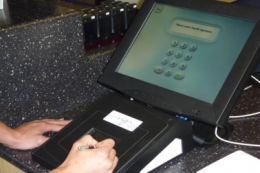Unique 'listening' technology tackles widespread fraud issues

Alaris, a joint venture startup company between ASU and Rolls-Royce, aims to tackle health care insurance fraud that is estimated to cost U.S. taxpayers more than $200 billion each year. This partnership was formed to commercialize a Rolls-Royce developed signature verification technology called SignHear in several markets including health care, retail banking and child care security.
SignHear dynamic signature verification by Alaris is a biometric technology that verifies identity by analyzing the unique sound patterns created by an individual’s written signature. These sounds are captured and analyzed by a patented algorithm that generates an acoustic signature template unique to each user. The technology originally was developed by Rolls-Royce to run quality tests on jet engine blades. By firing a sound impulse into a blade and analyzing the resulting wave patterns, engineers were able to determine if any structural faults or anomalies were present.
With the high cost of health care insurance fraud – estimated by the FBI to be as much as $220 billion annually – finding a preventative method of verification is an absolute necessity recognized throughout the health care industry. Currently, felonious claim submissions perpetrated by criminal rings and corrupt providers account for the majority of health care fraud costs. The industry currently relies on an ineffective post-service and reimbursement analysis of billing anomalies to identify potential claims fraud.
“SignHear technology affords health care with a game-changing strategy to fight fraud, shifting the industry’s current defensive approach to the offensive,” says Jeremy Kelstrom, CEO of Alaris.
Utilizing SignHear acoustic signature pads at the point of health care service prevents fraud before services are rendered and bills are paid. To date, other biometric methods of authentication have been rejected due to user invasiveness. As signature capture in health care is the traditional form of both clinical procedure and financial obligation acknowledgement, signature authentication technology is universally accepted by patients and providers.
Applications for this technology are widespread. For example, SignHear technology by Alaris is now an integral part of select Boys & Girls Clubs facilities in Scottsdale, Ariz. Parents of children attending after-school functions and summer camps can now sign their children out of care using SignHear. Parents and staff enjoy additional peace of mind as the SignHear system can identify precisely which children are present in the facility at any given time. Additionally, the system tracks the hours of volunteer staff, ensuring they receive credit and recognition for donated hours worked.
Alaris has been supported in its development by Arizona Technology Enterprises, the exclusive intellectual property management and technology transfer organization for Arizona State University, and the ASU Venture Catalyst.
Provided by Arizona State University















